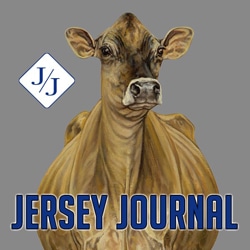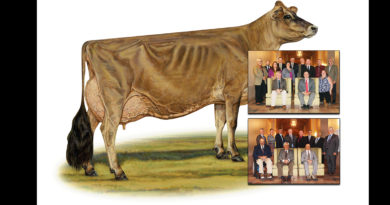Owens Family Featured in Legacy Series
Welcome to the Legacy Series featuring Master Breeders of the American Jersey Cattle Association (AJCA). Over the next several months, the Jersey Journal will be sharing stories with you previous recipients of this prestigious award. We have asked each of them a series of questions covering topics from philosophy, farm history, breeding questions and even what they might be if they had not taken the route of Jersey breeder. We hope you enjoy getting to know these Jersey breeders and their advice and thoughts to the Jersey world today.
Owens Farms Inc., Frederic, Wis.
Wilfred, Walter and Roger Owens of Owens Farms Inc.~2019 Master Breeders

Historical Questions:
Describe your farm history and how Registered Jerseys became a part of your herd.
Our farm was purchased in 1912 by our grandfather, Wilfred Owens. He didn’t raise any calves; he just purchased cows. He milked all breeds. Our dad, Harold Owens, took over the farm in 1936, with Wilfred’s passing. In the early 1940s, he started milking all Jerseys. He believed there was more profit per acre with Jerseys and we have never wavered from that belief. He kept adding registered cows to the herd. He kept detailed records so we were able to register the remainder when the Genetic Recovery program became available.
What did receiving the Master Breeder award mean to you and your family?
The award is truly an honor to win. Seeing all the previous winners shows us so many great Jersey breeders have won already. There are many other Jersey dairy producers very deserving.
Who were/are your mentors in the dairy industry?
Our mentor was definitely our father. We all learned so much about breeding cows and every aspect of farming from working alongside him day after day.

Your Story:
In your opinion who have been the most influential bulls and cows to your breeding program?
There are so many bulls that influenced our herd it’s hard to name just a few. Our herd is homebred and all cows are bred quite similarly so no particular cow families stick out.
What do you consider your biggest success in the Registered Jersey business?
Our biggest success has probably been just breeding a quality herd over time. We have been fortunate to put several bulls in A.I. which have influenced the breed. O.F. Mannix Rebel was #1 active A.I. bull for a period of time. We also bred the first two-time Premier Performance Cow at the All American, O.F. Lester Ladyslipper.
What one thing would you change that didn’t turn out the way you envisioned it?
We purchased a couple of cows for their calves. Each had sons we used that were Rectovaginal Constriction carriers.
Why did you choose to stay with (or start) with Jerseys when the industry was going elsewhere?
We chose to stay with Jerseys because we always believed they were the most profitable and the easiest breed to work with. We all know the advantages Jerseys have over all other breeds.
What or who (human or animal) inspires you to milk cows?
The next generation staying on the farm is what inspires us the most.
Did you ever experience difficulties with financial institutions based on your choice of breed? If so, how did you handle?
We have never had any difficulties dealing with financial institutions. We remember our dad telling people that were buying cows from us to have their lender call our banker if they had any questions about lending money to buy Jerseys. Some of them did and it helped.
Your Philosophy and Take on the Future:
What traits do or did you focus on the most for your breeding program? How did this evolve and change over time?
How do you think they will change in the next 20 years as technology continues to evolve?
For years we have focused on production, high components, and functional type, particularly udders and legs. That has evolved over time into more health traits as more information becomes available. Genomics now play an important part in our breeding program. We’re not sure what new technology will bring in the years to come, but we need to be ready to use it as it becomes available. We believe genomics will be more refined over time.
What piece of information on breeding do you know now that you wish you had known when you started out?
We wish the information you get from genomics had been available when we started out.
What is the biggest change you have seen in the dairy industry over your years of involvement?
Both the ability of the cows to produce larger amounts of high quality milk and the conformation of the cow has improved.
In 20 years, what do you think the average size of a commercial farm will be? How will that affect breeding decisions?
It will definitely keep growing. We couldn’t guess by how much. It won’t have much affect on breeding decisions. Breeders will still try to breed a profitable cow.
What do you think has been the greatest challenge the Jersey breed has, or will encounter?
The greatest challenge the breed has overcome is getting more production and people with other breeds of cattle to realize Jerseys are most profitable of all breeds. Going forward we have to work to keep breeding the kind of cow the industry needs.
What do you see as the future of the Jersey cow?
The Jersey will keep gaining popularity because of her efficiencies over other breeds and the advantage of longevity. Her environmental impact compared to other breeds will be more important as time goes on.
Promotion and Marketing:
As you worked with cow families in your herd, what avenues did you find were the best ways to get the word out about potential bull mothers, young bulls for sales, or special heifers in the herd?
- Keeping the herd registered and on DHIR Test.
- Advertising the special ones in the Jersey Journal.
- Word of mouth is also very helpful.
Your dairy has had a strong presence in the Jersey Journal through the years, through advertising and/or award recognitions. How do you feel this has benefitted the marketability of your genetics?
Advertising in the Jersey Journal helps to get your farm name out to potential buyers. From advertising, people also become familiar with your best cow families and bulls.
The US Jersey organizations offer many management tools for herds in the Jersey business. What programs have been the most beneficial to your growth and why?
The Equity part of REAP has been the most beneficial part because it made Jersey milk more valuable through cheese yield pricing. Making the milk more valuable made Jersey genetics more valuable for all Jersey breeders. REAP as a whole has been good because we get many services at a reduced cost. One service we use is JerseyMate because we select the sires to use and JerseyMate suggests the mating. We still make the final decision.
What words of wisdom would you give to young breeders just starting out?
Have a plan. Be diligent with what you do. Be patient. Follow the advice of people that have been successful. It is a business and must be run that way to be successful.
Your Dairy’s Future:

What’s next for your dairy?
We are going to focus on getting it turned over to the next generation.
What do you do if there is another generation coming onto the farm to pass on your breeding mentality/ legacy?
We work with them and have talked to them how we’ve bred cows and why. We think they’ve learned from this, yet they need to follow a path toward their goals.
Time for Some Fun!
If you could bring any cow back from the dead and breed her one more time, guarantee heifer calf. What would you breed her to?
Wilfred – O.F. Lester Ladyslipper to WF/L&M Duncan Barber-ET
Walter – Generators Topsy to A-Nine Top Brass
Roger – O.F. Campbell Kassandra to Soldierboy Boomer Sooner of CJF
What is one of your favorite cow (or cow families) that you have not bred?
Wilfred – Marlu Milad Fada
Walter – Beacon Bas Patience
Roger – Topsy & Tenn Haug E Maid
If you were not a dairy farmer, what would you do career wise?
Wilfred – Retire
Walter – Work in AI industry or milk testing industry
Roger – Involvement in local government and the food service industry




